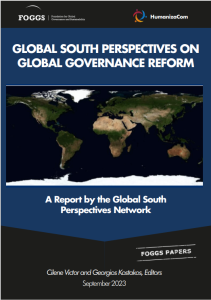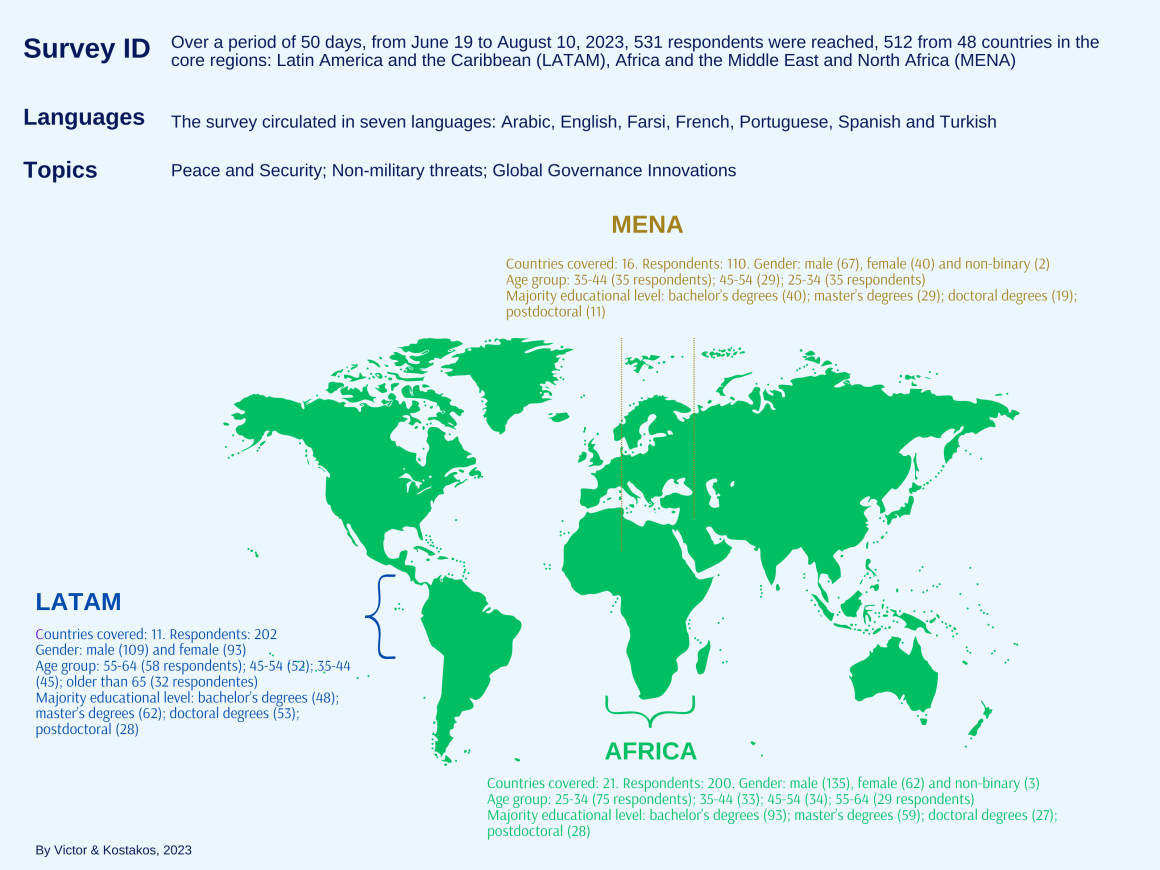A recent comprehensive survey conducted by the Global South Perspectives Network, an initiative of the Foundation for Global Governance and Sustainability (FOGGS) and the research group Humanitarian Journalism and Media Interventions (HumanizaCom) of the Methodist University of São Paulo, has offered a unique vantage point on the multifaceted landscape of peace and security threats across three significant regions: Latin America and the Caribbean (LATAM), Africa, and the Middle East and North Africa (MENA). With a dataset comprising responses from 531 participants, 512 of them from the target regions (see survey ID map), this survey has provided valuable insights into the nuanced perceptions and challenges related to peace and security in these regions.
First and foremost, it is essential to underline the demographic commonalities that span across these regions. A majority of respondents, regardless of their regional origin, identified as male. The age distribution was notably diverse, with a prevalence of educators, students, and individuals with higher education qualifications.
Turning our attention to the core findings, participants were requested to rate the significance of various peace and security threats on a scale ranging from 1 to 5, with 1 signifying “not significant” and 5 denoting “extremely significant.” The findings underscore the complex and interconnected nature of peace and security challenges in the Global South. Organized crime, including drug trafficking, emerged as a persistent and alarming concern shared across all three regions. This underscores the enduring menace that transnational criminal networks pose to peace and security in the Global South.
In both Africa and MENA, religious conflicts garnered noteworthy attention, indicating a heightened sensitivity to the interplay of faith and security in these regions. In LATAM, religious conflicts were generally considered less significant, unlike ethnic conflicts, which were perceived as significant, rooted in historical exploitation and marginalization of Indigenous and Afro-descendant communities. This calls for a deeper examination of the historical and sociopolitical dynamics at play.
While conflicts with neighbouring or distant countries were not regarded as substantial threats to peace and security, internal conflicts and civil wars retained a salient presence in all three regions. These findings signal a relative stability in inter-state relations across these regions, with diverse experiences and attitudes towards internal conflict.
Profound skepticism was evident in the way respondents evaluated the effectiveness of the United Nations in addressing the peace and security threats. Whether in LATAM, Africa, or MENA, the overall sentiment towards the UN’s actions leaned predominantly towards them being considered moderately effective or, more starkly, ineffective.
This pervasive skepticism does more than just raise questions; it triggers a fundamental reassessment of the mechanisms and approaches employed by international organizations, specifically the United Nations, their relevance and adequacy for the diverse contexts and concerns that permeate the Global South. This skepticism is a call for more tailored and region-specific approaches that not only address the immediate issues but also account for the historical, cultural, and sociopolitical nuances that shape the peace and security landscape in each region. In essence, it signifies a moment of reckoning for international organizations, urging them to align their efforts more closely with the actual needs and aspirations of the communities they purport to serve.
The core findings of the survey, particularly the persistent threat of organized crime, religious conflicts in Africa and MENA, and ethnic conflicts in LATAM, point to the complex and interconnected peace, security and socio-economic challenges that require coordinated international efforts to be adequately addressed.
The recognition that current UN mechanisms and approaches may not be adequately adapted to the diverse contexts and concerns of the Global South necessitates a reassessment of how the UN addresses these multifaceted challenges and serves as a wake-up call for the world body. At the same time, these results underscore the pivotal role of multilateralism. The challenges highlighted in the survey are not limited to a single nation but transcend borders. As such, effective solutions must involve collaboration and coordination on a global scale through a reinvigorated commitment to multilateralism.
* With contributions from Andrea Waichman and Olivia Simão (LATAM) and Mah dy Yusofi (MENA), members of the Global South Perspectives Network that is convened by Cilene Victor (HumanizaCom) and Georgios Kostakos (FOGGS). This is the first in a series of articles based in whole or in part on the analysis of the Global South Perspectives Network survey results, which have been previously presented in the report entitled “Global South Perspectives on Global Governance Reform” of September 2023. FOGGS wishes to acknowledge the kind support of the Global Challenges Foundation that made the survey and the report possible.
dy Yusofi (MENA), members of the Global South Perspectives Network that is convened by Cilene Victor (HumanizaCom) and Georgios Kostakos (FOGGS). This is the first in a series of articles based in whole or in part on the analysis of the Global South Perspectives Network survey results, which have been previously presented in the report entitled “Global South Perspectives on Global Governance Reform” of September 2023. FOGGS wishes to acknowledge the kind support of the Global Challenges Foundation that made the survey and the report possible.




